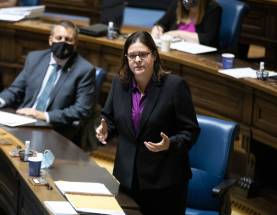Tories’ path to re-election is steep uphill climb
Read this article for free:
or
Already have an account? Log in here »
To continue reading, please subscribe:
Monthly Digital Subscription
$0 for the first 4 weeks*
- Enjoy unlimited reading on winnipegfreepress.com
- Read the E-Edition, our digital replica newspaper
- Access News Break, our award-winning app
- Play interactive puzzles
*No charge for 4 weeks then price increases to the regular rate of $19.00 plus GST every four weeks. Offer available to new and qualified returning subscribers only. Cancel any time.
Monthly Digital Subscription
$4.75/week*
- Enjoy unlimited reading on winnipegfreepress.com
- Read the E-Edition, our digital replica newspaper
- Access News Break, our award-winning app
- Play interactive puzzles
*Billed as $19 plus GST every four weeks. Cancel any time.
To continue reading, please subscribe:
Add Free Press access to your Brandon Sun subscription for only an additional
$1 for the first 4 weeks*
*Your next subscription payment will increase by $1.00 and you will be charged $16.99 plus GST for four weeks. After four weeks, your payment will increase to $23.99 plus GST every four weeks.
Read unlimited articles for free today:
or
Already have an account? Log in here »
Hey there, time traveller!
This article was published 28/09/2022 (1166 days ago), so information in it may no longer be current.
There is usually little an incumbent government can do to regain public trust once it has been lost. It appears Manitoba’s Progressive Conservative party falls into that category. Public opinion polls over the past year have shown Tory support has plummeted to levels that, if an election were held, would return the party to the opposition benches after only six years in office.
A Probe Research/Free Press poll confirmed that again this week. It found 37 per cent of Manitobans would vote for Premier Heather Stefanson’s PC party, well below the 44 per cent who chose the NDP. More crucially for the Tories, the party only has 25 per cent support in Winnipeg, where provincial elections are normally won and lost. That compares with 52 per cent for the NDP.
Under that scenario, the Tories would likely win only two or three seats in the capital city, making it virtually impossible for them to remain in government.
There are many reasons why the Tories have lost the confidence of Manitobans. The PC government’s mishandling of the COVID-19 pandemic is likely the most significant, under both former premier Brian Pallister and his successor, Premier Heather Stefanson, who was the minister of health during some of the province’s worst pandemic gaffes.
MIKAELA MACKENZIE / WINNIPEG FREE PRESS FILES
The rejection of expert advice to tighten public-health measures during the third wave of the pandemic last year was the most egregious of those lapses in judgment. The results were catastrophic: a collapse of critical care services at Manitoba hospitals and the need to airlift dozens of COVID-19 patients out of province for care.
Throughout the pandemic, the PC government refused to share crucial information with Manitobans, whether it was modelling data that projected infection rates and hospitalizations, or statistics around severe outcomes. The disinclination to release public information has become a habit in many government departments under the Tories, a trait that has fueled suspicion and mistrust.
The Tory government’s hospital consolidation plan, first launched in 2017, also contributed to an erosion of confidence in government. It was executed haphazardly and without input from front-line health-care workers. The staffing shortages and lack of hospital bed capacity that ensued are at least partly to blame for today’s emergency room crisis.
Add to that the PC government’s surprise attempt to eliminate English-language school divisions (a plan since abandoned by Ms. Stefanson) and its budget cuts or freezes to key areas of health care, education and municipal funding (including to the city of Winnipeg), and the mistrust of government is not difficult to explain.
A commitment in the 2023 budget to adequately fund front-line services may restore some trust, as would efforts to become more open and transparent with Manitobans.
If there is anything the PC government can do between now and Oct. 3, 2023 — the next scheduled provincial election — to regain that confidence, it won’t come easy. Significant improvements in surgical and diagnostic wait times, as well as concrete steps to solve the ER crisis, would help. A commitment in the 2023 budget to adequately fund front-line services may restore some trust, as would efforts to become more open and transparent with Manitobans.
With only a year left before the next election, and no improvement in public opinion polls over the past 12 months, rebuilding that confidence will be an uphill battle. It may, in the end, be futile. Public trust in government is a fragile commodity that is not easily repaired. The PC government has done much over the past six years to undermine it. The damage may be irreversible.







